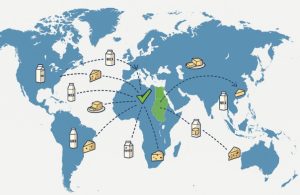The UK’s dairy sector has secured a significant trade advantage following a new agreement with Egypt that removes a costly export barrier.
This change eliminates the need for halal certification on dairy products, cutting red tape and reducing fees by over £1,000 per shipment.
With access to one of the Middle East’s key markets now more straightforward, UK farmers stand to benefit from an estimated £250 million in additional export opportunities over the next five years.
What Recent Change Has Boosted UK Dairy Exports To Egypt?

British dairy exporters are now positioned to take greater advantage of the Egyptian market thanks to a successful intervention by the UK Government.
A planned trade barrier that would have imposed new certification requirements has been withdrawn, marking a critical win for the agriculture sector.
This change supports smoother dairy exports and creates a more favourable trading environment.
Removal Of The Halal Certification Requirement
The most notable change is the removal of a proposed mandatory halal certification for all dairy products exported to Egypt.
Originally set to be enforced from January 2025, this regulation would have required UK exporters to secure halal approval for each shipment, regardless of the product’s suitability or existing quality standards.
This requirement posed several challenges:
- It would have added more than £1,000 in certification fees per shipment
- It involved additional paperwork and compliance processes
- It threatened to delay shipments and limit product access to the Egyptian market
By preventing the regulation from taking effect, the UK has preserved uninterrupted market access for a wide range of dairy products, including milk, cheese, butter, and cream.
Diplomatic Efforts Behind The Change
The removal of the halal certification rule was the result of coordinated diplomatic efforts led by the Department for Business and Trade (DBT) and the Department for Environment, Food and Rural Affairs (Defra). These efforts included continuous engagement with Egyptian regulatory authorities such as:
- The National Food Safety Authority of Egypt
- The General Organization for Veterinary Services
- UK agricultural and food attachés based in Africa
These teams worked to highlight the compliance of UK dairy standards with international norms and demonstrated that the proposed certification was unnecessary for the UK’s high-quality dairy exports.
Preserving Trade Stability And Market Confidence
Preventing the implementation of this barrier was crucial not only in maintaining trade flow but also in ensuring confidence among UK exporters and Egyptian importers.
Had the barrier gone into effect, it could have disrupted existing supply chains, introduced delivery delays, and discouraged new exporters from entering the market.
By securing the current trade terms, the UK has reinforced its commitment to supporting agricultural exports and preserving long-standing trade relationships.
Alignment With UK Trade Strategy Goals
This development is a practical example of the UK Government’s Trade Strategy and Plan for Change in action. These strategies focus on removing non-tariff barriers, improving export readiness for businesses, and enhancing bilateral trade relations.
The agreement with Egypt directly contributes to the UK’s goal of growing exports by unlocking access to high-value international markets, particularly in regions with growing demand for quality food products.
How Much Are UK Farmers Expected To Gain From This Deal?

The economic implications of the change are substantial. The deal is expected to protect export opportunities worth approximately £250 million over five years.
This figure is based on a government estimate ranging between £100 million and £400 million, reflecting both existing trade and potential growth in the sector.
Key benefits for UK exporters include:
- Removal of certification fees estimated at over £1,000 per shipment
- Elimination of paperwork and procedural delays at customs
- Expanded market access for dairy businesses of all sizes
This reduction in cost and complexity not only protects the value of current exports but also encourages new exporters to explore trade with Egypt.
It improves the competitiveness of British dairy products by reducing price pressures and speeding up delivery timelines.
Why Is Egypt An Important Market For UK Dairy Products?
Egypt has been a consistent and valuable market for UK dairy exports. In 2024, British dairy exports to Egypt were valued at around £26 million.
Much of this value was driven by powdered milk and cream, products widely used in Egyptian food manufacturing and retail.
The Egyptian market is considered strategically important for several reasons:
- It is one of the most populous countries in the Middle East and North Africa region
- Rising consumer demand for high-quality dairy creates consistent demand
- Egypt’s location allows further trade connections across neighbouring regions
Given the economic potential and trade volume, maintaining easy access to the Egyptian market is essential for UK dairy exporters.
Egypt’s Significance In UK Dairy Trade
| Criteria | Relevance to UK Dairy Exports |
| Export Value in 2024 | £26 million |
| Primary Dairy Imports from UK | Powdered milk, cream |
| Market Drivers | Population growth, rising demand |
| Trade Region | Middle East and North Africa (MENA) |
With the new trade arrangement in place, Egypt is now an even more attractive destination for UK producers looking to expand their reach and diversify export portfolios.
What Dairy Products Are Most Affected By This Change?
While all dairy exports stand to gain from smoother access, certain products are particularly well-positioned to benefit. These include:
- Milk powders used in food processing and industrial applications
- Butter varieties, especially salted and unsalted farmhouse butters
- Cheddar and other mature cheeses popular in retail and foodservice
- Clotted cream and cream-based dairy goods that appeal to niche markets
These products were previously subject to strict documentation that limited trade volume and increased operational costs.
Now, with the removal of the halal certification requirement, exporters can pursue these opportunities more confidently.
The change also opens doors for high-end dairy products that were previously less viable due to the high cost of certification per shipment.
Impact Of Certification Removal On Dairy Product Categories
| Product Category | Trade Impact Before Deal | Trade Impact After Deal |
| Milk Powder | High volume, high cost | Lower cost, improved competitiveness |
| Butter | Limited exports due to fees | Greater market access |
| Cheese | Certification created delays | Faster processing and clearance |
| Clotted Cream | Niche item, limited feasibility | New opportunities in premium retail |
These improved conditions are expected to lead to increased export volumes, stronger commercial relationships, and more consistent supply chains into Egypt.
How Does This Change Support The Government’s Trade Strategy?
This agreement aligns closely with the UK Government’s Trade Strategy and Plan for Change, which aim to make exporting more accessible and profitable for domestic businesses.
One of the key goals of the strategy is to remove market access barriers, especially for rural and agricultural producers.
The deal delivers on multiple elements of the trade plan:
- Reducing the cost of export compliance
- Expanding international opportunities for UK farmers
- Reinforcing the UK’s reputation for agricultural excellence
Officials from both DBT and Defra collaborated closely to resolve the issue. Their engagement included working with Egyptian government bodies such as the National Food Safety Authority and the General Organization for Veterinary Services.
The intervention also benefited from support from UK agricultural attachés working across Africa.
These efforts demonstrate the value of the government’s investment in trade diplomacy and specialist export support services.
Who Has Played A Role In Securing This Trade Win?

The success of this agreement reflects the involvement of multiple stakeholders both within and outside the UK. The departments involved include:
- The Department for Business and Trade, which led diplomatic engagements
- The Department for Environment, Food and Rural Affairs, which provided sector expertise
- The UK’s agricultural attachés for Africa, who supported coordination on the ground
In Egypt, collaboration with the National Food Safety Authority and the General Organization for Veterinary Services was crucial in reaching a consensus.
Rod Addy, Director General of the Provision Trade Federation, praised the decision, noting that removing the certification requirement “eliminates a longstanding trade barrier” and “opens growth opportunities for cheese and butter.”
The involvement of trade organisations and industry representatives ensured that the needs of exporters were clearly communicated and understood by policymakers on both sides.
What Are The Long-Term Benefits For UK Farmers And Rural Communities?
Beyond the immediate savings in certification costs, this deal provides long-term advantages for the UK’s rural economy. With streamlined procedures and fewer barriers to entry, smaller farms and processors can now access international markets that were previously out of reach.
Long-term benefits include:
- Increased revenue for farmers from exports
- Enhanced stability for dairy businesses with international exposure
- Greater investment into rural supply chains and infrastructure
- Improved resilience through market diversification
The deal also reinforces the idea that international trade can support local economies when access is equitable and regulatory requirements are fair.
By removing unnecessary costs, the UK Government is enabling more producers to scale and innovate while serving new customer bases abroad.
Could Other Export Markets Follow Egypt’s Lead?

The success of this trade intervention sets a positive precedent for future trade discussions. Egypt’s decision to drop a complex and costly certification requirement after UK engagement shows that diplomatic trade efforts can yield results.
Other countries with similar barriers may now be more open to negotiation, particularly if mutual benefits are evident.
The UK’s proactive approach to market access could encourage broader international cooperation, helping to open additional markets for British agriculture.
The agreement with Egypt also highlights the need for ongoing dialogue between governments, trade bodies, and industry representatives to ensure that trade regulations do not unnecessarily restrict business growth or limit global food access.
As the UK continues to forge new trade partnerships and modernise existing ones, this successful case provides a framework for how to pursue regulatory reform with long-term commercial and diplomatic benefits.
Conclusion
The removal of the halal certification requirement for dairy exports to Egypt marks a significant victory for UK farmers and the government’s export-driven economic strategy.
It not only protects existing trade valued at £26 million but also unlocks £250 million in potential opportunities over the next five years.
Thanks to collaborative efforts between UK governmental departments and Egyptian authorities, British dairy exporters can now access the Egyptian market with fewer hurdles, reduced costs, and greater confidence.
As the UK positions itself as a global leader in high-quality agricultural products, such strategic trade wins are essential to supporting rural communities, growing the economy, and strengthening international partnerships.
FAQs
What is halal certification, and why was it a barrier?
Halal certification verifies that products comply with Islamic dietary laws. In the case of UK dairy exports to Egypt, the proposed requirement would have added complexity and costs, as many dairy items were already considered halal by default. The certification process would have added over £1,000 per shipment, creating a significant financial and administrative barrier.
Which UK dairy companies export to Egypt?
While specific exporters aren’t always publicly disclosed, several large and medium UK dairy producers, particularly those dealing in milk powder, butter, and cheese, have previously exported to Egypt. With this change, it’s expected that more producers, including smaller farms, will begin exploring the market.
How does this change impact new exporters in the UK?
New exporters now face a much lower barrier to entry into the Egyptian market. Reduced certification requirements and lower export costs mean that even small-scale producers can consider international expansion, increasing their revenue potential and market exposure.
Are there any similar trade barriers in other countries?
Yes, various countries impose unique requirements for food imports, including halal certification, origin documentation, and product testing. The UK government continues to negotiate trade agreements to reduce or eliminate such barriers globally as part of its Trade Strategy.
What role does the WTO play in resolving trade issues like this?
The World Trade Organisation (WTO) facilitates discussions and dispute resolution among member countries. In this case, the WTO provided a platform for negotiation, but the success was primarily due to bilateral discussions between UK and Egyptian authorities.
Can smaller dairy farms benefit from this deal?
Absolutely. The reduction in administrative costs and certification fees levels the playing field for smaller producers who may have previously found the export market financially unfeasible.
How will this deal influence the UK’s future agricultural policies?
This trade win reinforces the UK Government’s commitment to supporting domestic agriculture through international trade. It may encourage future policy decisions that prioritise export facilitation, market access, and reduced bureaucracy for UK farmers.








